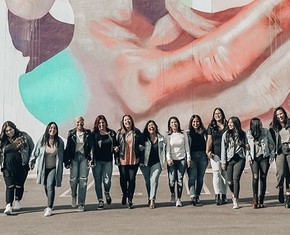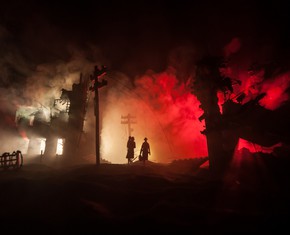The views expressed in our content reflect individual perspectives and do not represent the authoritative views of the Baha'i Faith.
As recent campaigns have reminded us all, it’s hard to escape or be unaffected by the constant conflict and polarizing effects of a partisan political system.
We often think of the adversarial nature of partisan politics as an integral part of democracy, although that isn’t the case. Interestingly, the American founding fathers purposely avoided all mention of political parties in the United States constitution, fearing the divisiveness of the partisan factions that had torn England apart.
RELATED: Conceiving a World Commonwealth — With the Politics of Love
In the words of George Washington:
The alternate domination of one faction over another, sharpened by the spirit of revenge, natural to party dissension, which in different ages and countries has perpetrated the most horrid enormities, is itself a frightful despotism.
John Adams and Alexander Hamilton were of the same mind, respectively referring to political parties as “the great political evil” and “the most fatal disease.”
Of course, actively upholding justice often involves opposing points of view. “If you are neutral in situations of injustice, you have chosen the side of the oppressor,” Desmond Tutu said.
Working for peace and fairness in the world doesn’t mean neutrality. Instead, it means seeing all things with our own eyes and acting to find just solutions that respect all perspectives without adopting an “us vs. them” mindset.
We can fight injustice without fighting each other.
The Baha’i teachings point out that such injustices often come from our prejudices, including political bias. In a speech he gave in Sacramento, California in 1912, Abdu’l-Baha said:
… so long as prejudice — whether religious, racial, patriotic, political or sectarian — continues to exist among mankind, universal peace cannot become a reality in the world. From the earliest history of man down to the present time all the wars and bloodshed which have taken place were caused either by religious, racial, political or sectarian bias. Therefore, it is evident that so long as these prejudices continue, the world of humanity cannot attain peace and composure.
The Universal House of Justice, the democratically-elected international governing body of the Baha’i Faith, used an interesting phrase in a May 2024 letter about the world’s current situation. It asked the world’s Baha’i youth to be “practitioners of peace:”
You are among the most active and earnest of humanity’s well-wishers. But, whether through deeds or words, the merit of your every contribution to social well-being lies, first, in your resolute commitment to discover that precious point of unity where contrasting perspectives overlap and around which contending peoples can coalesce.
This is not easy. Adversarial political structures breed polarization and cynicism. Both social media and traditional media often instigate outrage and profit from doing so. The constant cycle of parties in power and out of power can brew alienation, discord, and extremism. How many times have we groaned at the complete lack of governmental efficiency and long-term planning as the inevitable swings of political power from one side to the other constantly overturn previous policies?
It doesn’t have to be this way.
For example, the consensus-style Government of Nunavut and also the Northwest Territories that currently exist in northern Canada more closely resemble traditional Inuit decision-making. In these Indigenous governance systems, there are no parties, no partisan platforms, and no official opposition. Those elected consult together to find policies and solutions that the majority can support. Unanimity isn’t required but is often achieved. MLAs (Members of the Legislative Assembly) are elected as independent members and, in turn, elect the Speaker, Premier, and Ministers. Ministers voice their views freely during deliberations, but once a decision is reached, all Ministers publicly support it. A separation of executive, legislative, and judicial powers, as well as other protocols, promote accountability and prevent corruption.
Baha’is recognize many of the features mentioned above as being either the same or compatible with the spiritual system of governance revealed by Baha’u’llah. That administrative order has now spread around the entire world — with elected local, regional, national, and international bodies functioning today as a harmonious whole, guiding diverse Baha’i communities made up of people from every class, culture, and color.
That Baha’i system has many advantages, including frank and honest consultation, non-partisan democratic elections with universal suffrage, and unified decision-making. Taken together, these essentially spiritual characteristics provide robust protections against extremism, which crops up too often in adversarial systems across the world. They mirror and encourage peaceful relations, providing a governance model that heals our social ills rather than creating more of them. They’re conducive to the type of selfless, altruistic leadership that causes communities to thrive: collaborative, moderate, and concerned with the welfare of all.
How do we get there from here? Thus far, attempts at reforming democratic political systems have at most tweaked the edges without fixing the structural flaws causing their inherent disunity and combativeness. From winner-take-all systems to various types of proportional representation, almost all are based on partisan politics and the desire for power.
What about systems that avoid parties altogether? In addition to the largely Indigenous northern Canadian systems mentioned above, the Baha’i community continues to govern effectively — and does so globally. From their inception, Baha’i communities have relied on a consultative, consensual system of governance that has sought to consider all sides, cultivate unity, and build capacity within the community.
Instead of professional clergy, Baha’i governing bodies composed of nine community members are elected by secret ballot on the basis of character and capacity, without nominations or campaigning, and with the understanding that they will serve the entire community to the best of their ability. The governance and decision-making processes of Baha’i communities are based on the rules and techniques of a form of consensus-seeking consultation well described in the Baha’i writings. They are designed to include all voices, particularly those of women, minorities, and youth.
Our world needs this kind of unifying, peaceful, and deliberative system of governance.
All around the planet, experiments in democracy are beginning to move us closer to this model. Citizen Assemblies represent a ground-breaking innovation where groups, chosen to demographically mirror the larger population, are asked to deliberate on specific issues and propose solutions that all can support. Ireland, for example, used a Citizens Assembly to successfully propose legislation on abortion that everyone could live with. In Taiwan, the Minister of Digital Affairs is encouraging participatory democracy through a system of online decision-making. Participants in Taiwan’s vTaiwan platforms can disagree with each other but must build on each other’s ideas by framing their contributions as positive proposals rather than rebuttals or attacks.
RELATED: What Could Replace the Politics of Chaos?
These new ways of governance have shown the world that successful methods for building public consensus do exist and can work well.
We need hearts and political structures to change in order to move away from a culture of divisiveness, disunity, and outrage. Contributing to social discourse in this area can encourage fundamental changes in decision-making processes, seeding not only new ideas but new ways of being. We can be “practitioners of peace,” helping to move people from adversarial camps to groups gathering together to respect one another, listen, consult, and come to an agreement.
This is the politics of peace.
















Comments
Sign in or create an account
Continue with Googleor